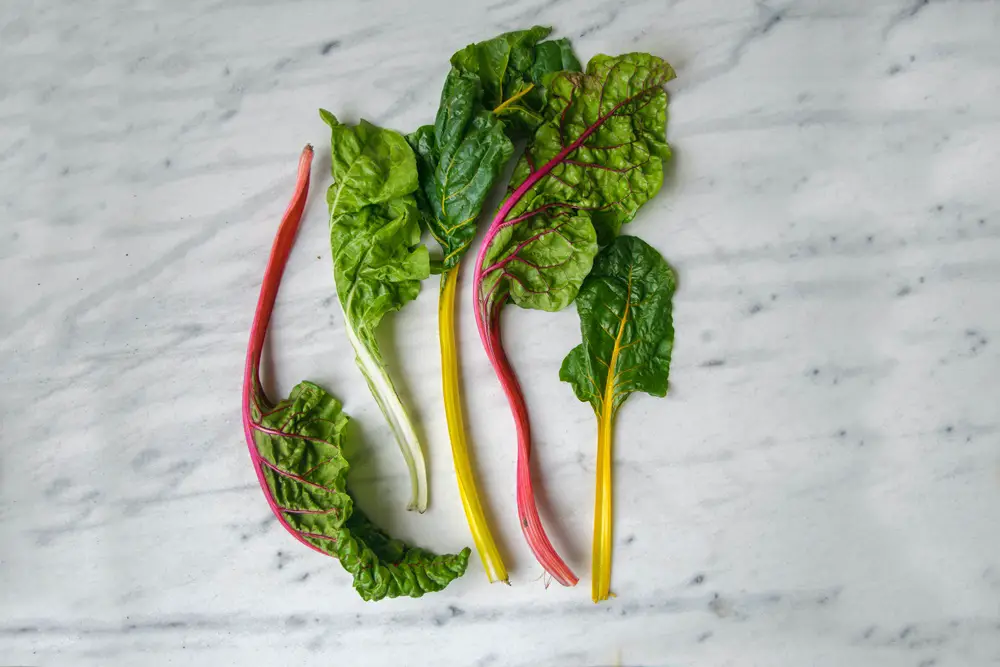You know that not all vegetables are safe for bearded dragons. You have chard in your kitchen, and you want to feed it to your pet. But can bearded dragons eat chard?
The answer is YES, if eaten in small amounts and occasionally. Chard offers several important nutrients that can support the overall health of bearded dragons.
In this article, we will talk about chard and how you can feed it to your beardies in a way that will not cause them any health issues.
Related Posts:
- How Long Can a Beardie Go Without Heat?
- How to Tell If Your Beardie Is Happy?
- Why Is My Beardie Bobbing His Head?
- How Big Can a Beardie Get?
- Can Beardies Get High?
- 20+ Tips to Setup Beardie Tank
- 30+ Beardie Body Language: How to Figure Out?
What Is Chard?
Chard is a leafy green vegetable belonging to the beet family that is popularly eaten in the Mediterranean. It contains vitamins A, C, and K and magnesium, potassium, and iron.
It is characterized by its large, glossy green leaves that are similar in appearance to spinach. But it also has colorful stems that can come in various shades, such as red, pink, yellow, or white.
Bearded dragons require a diverse range of nutrients to maintain good health and proper growth, and chard can offer some of these essential elements.
What Are the Benefits of Chard for Bearded Dragons?
When bearded dragons are healthy, they are more likely to be receptive to interactions with their owner. A healthy pet is happier, so you need to ensure they eat the right food.
Chards are low in calories, sugars, fat, and carbs but high in vitamins, minerals, antioxidants, and fibers.
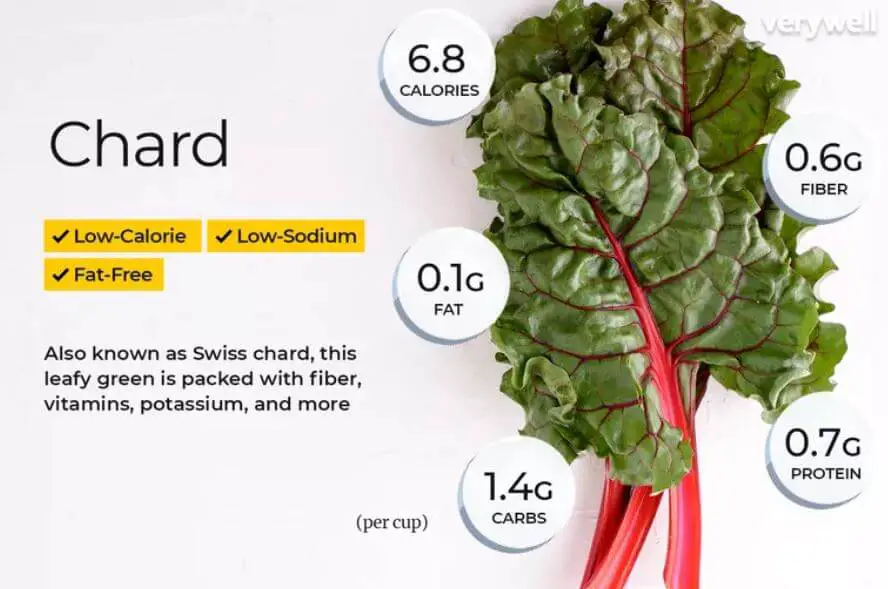
Due to its nutrient density and versatility, chard is a popular choice for those seeking to include more nutrient-rich greens in their pet’s diet.
100 grams of chard contains:
| Amount | Unit | |
| Vitamin A | 6124 | IU |
| Vitamin C | 18 | mg |
| Calcium | 58 | mg |
| Phosphorus | 33 | mg |
| Water | 92.65 | g |
The high vitamin A content in chard is particularly important for bearded dragons’ vision and immune system.
But it needs to be given in moderation as too much vitamin A is toxic.
When beardies overeat food with a high content of vitamin A, it will cause health problems such as metabolic bone disease.
Vitamin C is also high. Beardies and other reptiles need vitamin C to develop their immune system, but it can be harmful if too much.
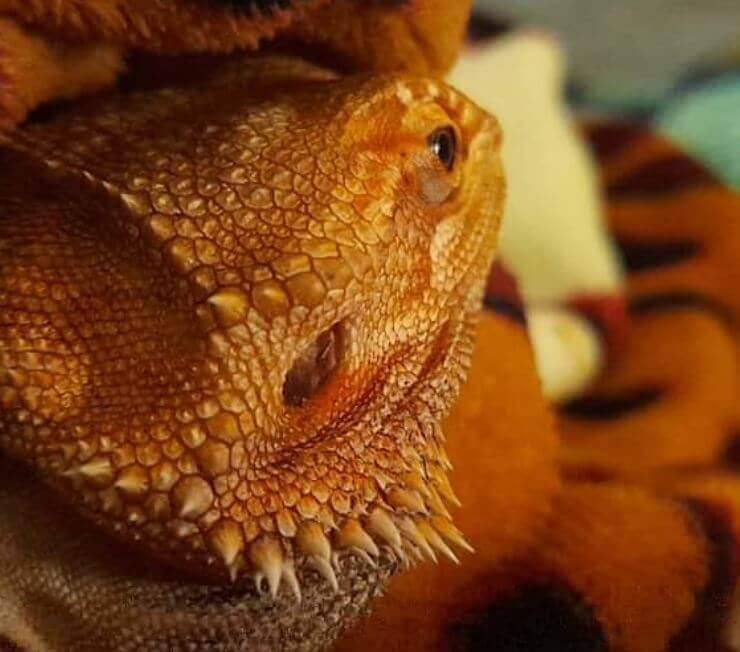
The calcium contained in this vegetable is in the excellent range.
Calcium is an essential mineral for beardie as it supports strong and healthy bones. If your beardie is not provided with enough calcium, there will be potential risks to their health.
Phosphorus is also just the right amount.
However, based on the table above, chard has high water content. Wet foods can be harmful to bearded dragons.
That said, chard should not appear in a bearded dragon’s diet frequently.
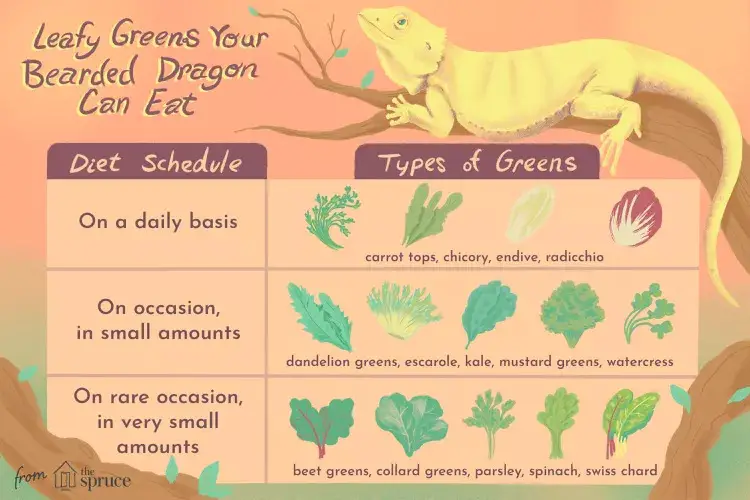
What Vegetables Are Safe for Bearded Dragons?
Even though bearded dragons can eat chard, it is not recommended if you, the pet owner, aren’t cautious. Chard becomes dangerous if eaten in large amounts.
If you don’t know what is “enough” when it comes to chard and bearded dragons, there are other safe vegetables that you can feed your pet.
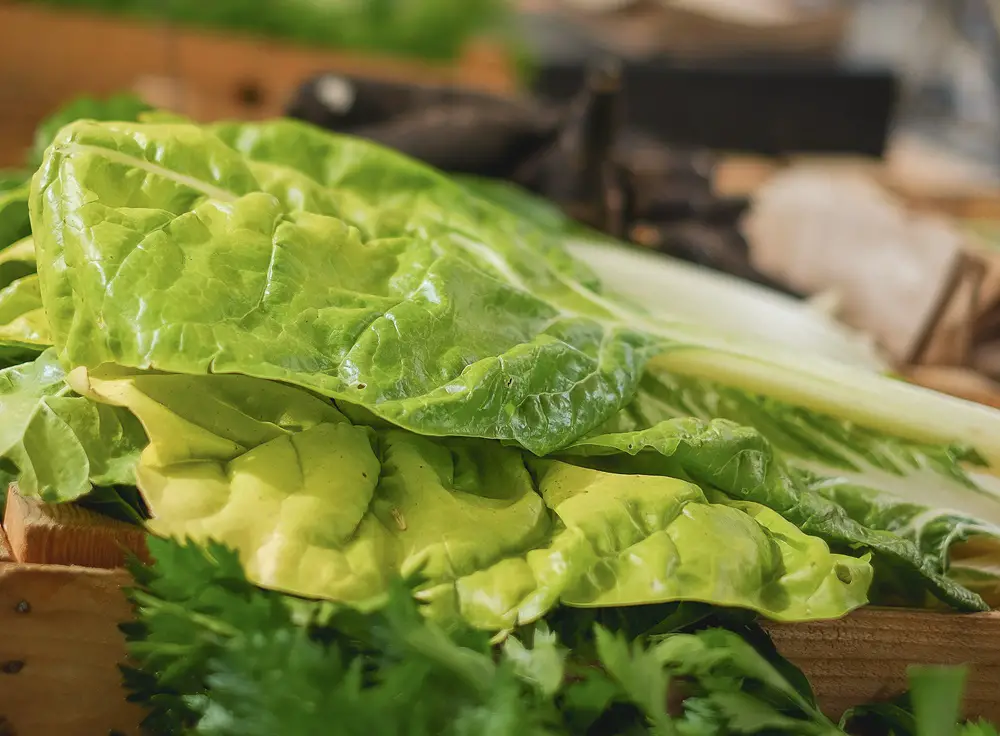
1. Squash
Any type of squash is safe for your pet because it contains a lot of fiber, calcium, and vitamin A in the right amount.
2. Mustard
Mustard is also good food for beardies. It has a suitable amount of vitamins A and C for boosting beardie’s health.
3. Turnip
Turnip also comes with a nice amount of vitamins C and A, which is a good addition to veggie salads.
4. Alfalfa
These greens are excellent for a beardie, but it should be the plant. Do not give your pet the sprouts.
5. Cactus Pad and Pear
These two are also on the list of healthy staple foods with high calcium, which is great for all reptiles.
6. Collard
Collard is great if you want a vegetable that can provide your beardie with high amounts of calcium.
7. Dandelion
Dandelion has high calcium and vitamin A, but you should take the spotless one.
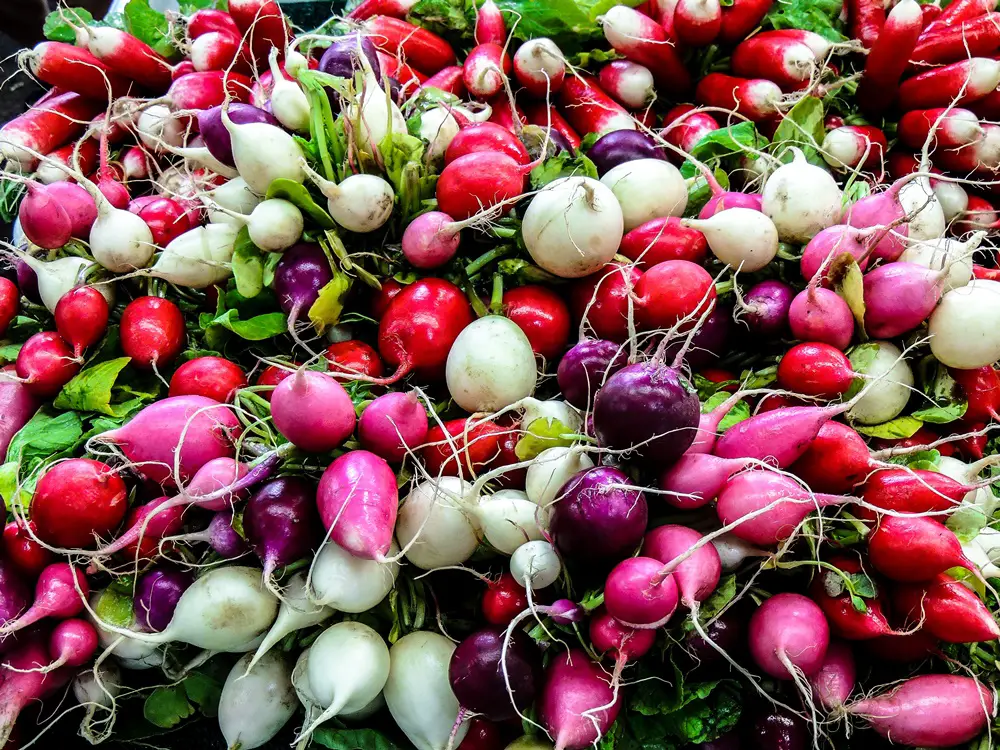
Related Posts:
What Vegetables Are Bad for Bearded Dragons?
1. Iceberg Lettuce
Iceberg lettuce is mostly water with little nutrition, so it will not help your bearded dragon at all.
2. Spinach
Spinach contains chemicals causing calcium deficiency, leading to metabolic bone disease, so it must be avoided.
3. Avocado
Avocados contain toxic chemicals for beardies. Just a small amount can make your pet ill!
4. Rhubarb
Rhubarb has a high level of oxalic acid, so it is poisonous for beardies.
How to Prepare Vegetables for Bearded Dragons?
If you don’t prepare the vegetables well, your pet may get digestive problems. Pesticides are harmful to the beardie’s health. Please don’t pick greens that you got in the wild.
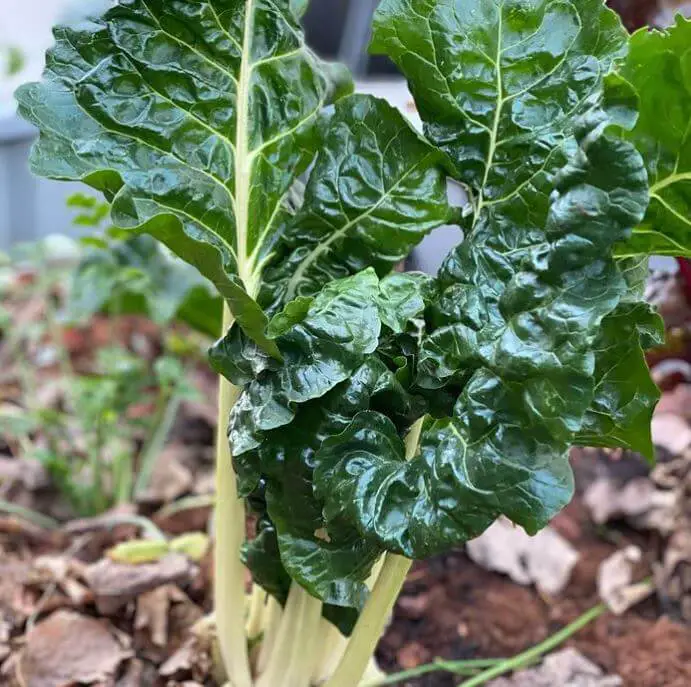
The size of the vegetables is also important. Beardies can choke and get digestive issues if they ingest a large piece of food.
It would be best if you made sure that the greens are chopped finely into small bite-size pieces. Look at the distance between your beardie’s eyes. The slices should not be larger than that.
Remember to mix those slices with other greens.
You can serve them by hand to create an excellent relationship with your pet, or you can put them into the bowl if you are busy.
Some guidelines for making a delicious salad for a beardie will be helpful for you. Let’s check it out right here!
Frequently Asked Questions About Vegetables for Bearded Dragons
1. Can Bearded Dragons Eat Swiss Chard?
Like other chards, the Swiss-type should be fed in small amounts. You can mix it with other greens.
Read More:
2. Can Bearded Dragons Eat Cooked Greens?
Bearded dragons can eat cooked vegetables. But as mentioned earlier, some vegetables are bad for beardies. You should avoid the bad ones.
3. Can Bearded Dragons Eat Red Swiss Chard?
Red chard has a good calcium and phosphorus ratio. However, it is very acidic. Hence, it is not good for the beardie.
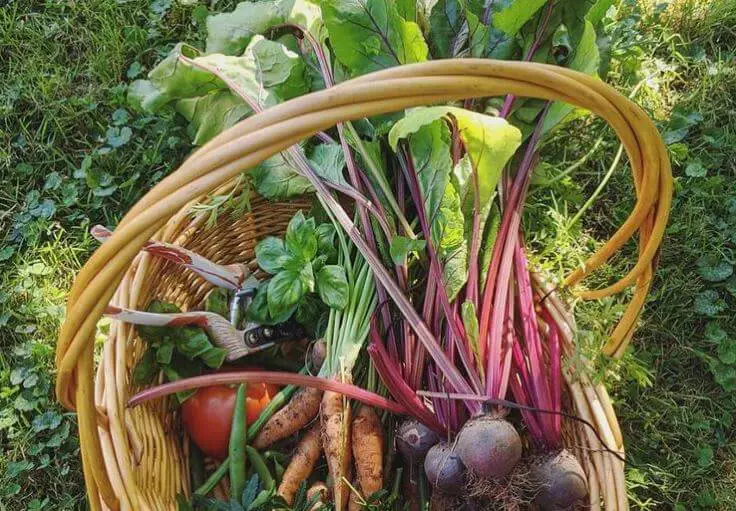
Conclusion
Can bearded dragons eat chard? The answer is YES, although it is not an ideal option for beardies because of its high acid and water content.
Thus, I recommend you choose other safer greens instead. With the list of good greens provided, I hope you enjoy it.
Key points on whether a bearded dragon can eat swiss chard:
Bearded dragons thrive on a diverse diet of vegetables and greens, but not all varieties are suitable for their consumption. Here’s a breakdown of feeding Swiss chard to bearded dragons in a quick-reference bullet point format:
1. Nutritional Profile:
- Nutrient-Rich: Swiss chard is nutrient-dense and offers vitamins A, C, and K, along with minerals like calcium and iron.
- Oxalates Content: Swiss chard contains moderate to high levels of oxalates, which can interfere with calcium absorption.
2. Feeding Guidelines:
- Moderation is Key: Due to its oxalate content, Swiss chard should be fed in moderation and as part of a varied diet.
- Consider Oxalates: Oxalates may hinder calcium absorption, so it’s advisable to balance it with other low-oxalate greens.
3. Preparation and Serving:
- Proper Preparation: Before feeding, wash the Swiss chard thoroughly to remove any pesticides or residue.
- Serving Size: Offer small, chopped pieces of Swiss chard occasionally, mixed with other greens to diversify their diet.
4. Oxalate Concerns:
- Calcium Binding: High oxalates in Swiss chard can bind to calcium, potentially leading to reduced calcium absorption in bearded dragons.
- Avoid Overfeeding: Excessive consumption of high-oxalate greens might contribute to metabolic issues or calcium deficiency.
5. Variety in Diet:
- Balanced Greens: Rotate Swiss chard with other greens low in oxalates, such as collard greens, mustard greens, or turnip greens, to maintain a balanced diet.
- Include Calcium-Rich Foods: Ensure ample calcium intake by offering calcium-rich feeders like calcium-dusted insects or appropriate supplements.
6. Watch for Reactions:
- Observe Behaviors: Introduce Swiss chard gradually and monitor your dragon for any adverse reactions, digestive discomfort, or changes in stool.
- Seek Veterinary Advice: If unsure about introducing Swiss chard or observing any negative effects, consult with a reptile veterinarian.
7. Dietary Diversity:
- Diversify Diet: Bearded dragons benefit from a variety of greens and vegetables to obtain a wide range of nutrients.
- Avoid Staple Diet: Avoid relying solely on Swiss chard as a staple, as its oxalate content could affect calcium absorption over time.
8. Alternate Greens:
- Safe Alternatives: Include a mix of safe greens like dandelion greens, kale, endive, or escarole to provide nutritional diversity without excessive oxalates.
Offering Swiss chard to your bearded dragon infrequently and in small portions as part of a varied diet can be acceptable. However, considering its oxalate content, it’s advisable to balance its consumption with low-oxalate greens to maintain optimal health and calcium absorption for your pet reptile. Always prioritize a diverse and balanced diet for the overall well-being of your bearded dragon.
Further Reading:
- Carolina Custom Cages Terrarium Review
- 8 Best Basking Rock for Beardie: What Is the Best Choice?
- 10 Best Thermometers for Beardie: How to Choose the Best One?
- 5 Best Beardie Lighting Setups for Beardie Lovers
- 9 Best Heat Lamps for Beardie: Natural Habitat Provided

